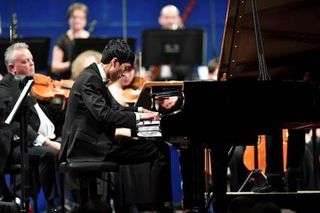|
Back
An exciting finale Leeds
Leeds Town Hall
09/14/2018 - & September 15, 2018
Wolfgang Amadeus Mozart: Piano Concerto No. 24 in C minor, K. 491
Sergei Prokofiev: Piano Concerto No. 3 in C major, Op. 26
Ludwig van Beethoven: Piano Concertos No. 1 in C major, Op. 15, & No. 4 in G major, Op. 58
Robert Schumann: Piano Concerto in A minor, Op. 54
Aljosa Jurinic, Anna Geniushene, Mario Häring, Xinyuan Wang, Eric Lu (piano)
The Hallé Orchestra, Edward Gardner (conductor)

E. Lu (© Simon Wilkinson)
The 19th triennial Leeds International Piano Competition concluded with two concerts featuring each of the five finalists performing a concerto with the Hallé Orchestra under Edward Gardner. This was each performer’s third appearance for the jury whose final decision was based on all three performances.
Leading off was 29-year-old Croatian Aljosa Jurinic with Mozart’s Piano Concerto No. 24 in which he displayed admirable crispness and nicely varied dynamics. The second movement (Larghetto) was effectively limpid, although with a hint of stiffness.
He was followed by the 27-year-old Russian Anna Geniushene with Prokofiev’s Piano Concerto No. 2. A razor-sharp sense of unity between soloist and orchestra was in evidence (any disunity in this work would have been glaring). There was somewhat of a sense of routine about the performance - routine at a very high level, but routine nonetheless. Neither she nor Mr. Jurincic finished in the final three.
The last pianist on the first night was 28-year-old Mario Häring from Germany. (He is of Eurasian descent, his mother being Japanese.) He gave a lively, crystalline performance of Beethoven’s Piano Concerto No. 1. Once again the balance between soloist and orchestra was pretty much ideal (especially in the racing treatment of the concluding Rondo), although a leaner-sounding orchestra (even a period orchestra) would have been more in keeping with his crisp approach.
The second concert began with Robert Schumann’s only piano concerto performed by 23-year-old Xinyuang Wang from China. The opening was nicely molded and the first movement’s cadenza built excitingly into a near-frenzy, but without ever losing control. The second movement, with its Andantino grazioso, was notably pensive. He brought the work to a rousing finish and a very enthusiastic response. As he entered and began the work he looked extremely serious, almost grim, and displayed expressive facial expressions throughout. At the end, though, he revealed a bouncing puckishness, giving two thumbs up and the victory sign.
The fifth finalist was the 20-year-old American, Eric Lu, playing Beethoven’s subtly daunting Piano Concerto No. 4. In 2015 he placed a very respectable fourth in the Warsaw International Chopin Competition, and in each of his three previous appearances at this competition included he played Chopin. Notably outstanding was his performance of the Piano Sonata No. 2 in his semi-final performance. The jury could have requested Chopin’s Piano Concerto No. 2 from him (each entrant submitted two possible concertos; the jury selected which one was to be played only when the five finalists were announced on September 11). They obviously wanted to hear him in something major by another composer and really got their wish. He gave a masterful performance in which the supernal second movement, Andante con moto, where the insistent, understated piano subdues the unruly orchestra, was absolutely breathtaking.
Prior to the competition awards, presented by Co-Artistic Director Paul Lewis, there was a ceremony during which the University of Leeds conferred an honorary D. Mus. on Lang Lang, the competition’s Global Ambassador. Mr. Lang brought an added degree of celebrity to the evening, but even he was eclipsed by the appearance of Dame Fanny Waterman (age 95), co-founder of the competition back in 1963, its Artistic Director until 2015, and now its Life President.
The prizes:
Winner of the medici.tv Audience Award was Xinyuan Wang. The finals were broadcast live via medici.tv to some 130 countries, and viewers had the opportunity to cast a vote. There seems to be no money conferred with this prize, but such worldwide exposure and approval surely ought to bring positive results. Mr. Wang’s facial expressions, which were more obvious on TV than in the concert hall, obviously did him no harm.
The orchestra members and Edward Gardner decided the Terence Judd Hallé Orchestra Prize (worth £ 5,500 and including three paid engagements with the orchestra); the winner was Eric Lu.
The Yaltah Menuhin Award (£ 3,000) for displaying “the greatest collaborative and empathetic qualities in the chamber performance of the semi-finals” went to Mario äaring. He had performed Dvorák’s Piano Quintet in A major with the Elias String Quartet.
The third prize (£ 10,000) went to Xinyuan Wang.
The second prize (£ 15,000) went to Mario Häring.
And the first prize (worth £ 25,000), with the Dame Fanny Waterman Gold Medal, went to Eric Lu, the youngest of the 68 pianists selected from about 200 applicants to go on to the first round. It can happen in such competitions that the top prize announcement comes as a surprise, but not this time, as the buzz for Eric Lu had been growing apace. The win comes with an impressive list of engagements, some coming up very soon.
Michael Johnson
|